Portions of this interview originally appeared in Nathaniel's column at Towleroad discussing "Pride," the year's most adorable movie. This is the full interview with additional topics, Matilda the Musical's upcoming film adaptation chief among them.
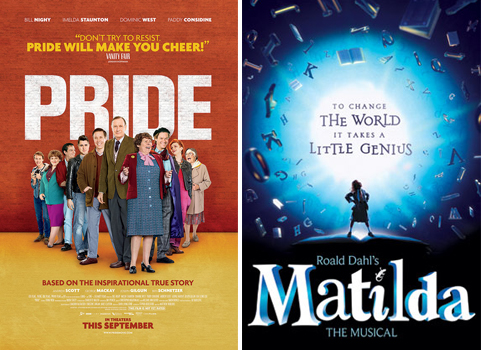
If you didn't get to cinemas these past two weekends, the year's most adorable movie is still waiting for you, eager to please. Pride has been playing New York, Los Angeles, and San Francisco but will add new cities next Friday. I expect all Film Experiencers to turn out for it! If you've read my review (aka paragraphs of me drooling on the movie) you'll know it's the true life LGBT story of a group of activists in the 1980s that stood up for striking miners during Margaret Thatcher’s bullying reign. The film is looking to be a "word of mouth" hit in miniature, but CBS Films plans to nurture it towards larger sleeper status. They'll be expanding carefully.
Two weeks back I had the opportunity to talk with the director Matthew Warchus who had just attended a pre-release screening with a "tumultous reaction" in LA. The 46 year old director, a stage veteran and Tony winner, recently replaced Kevin Spacey as the artistic director of the Old Vic so he isn't leaving the boards, he's just multi-tasking. He's already working on his follow up to Pride, a big screen adaptation of the Tony nominated hit Matilda: The Musical.
I talked to him about both projects, his stage directing skill set and how it affects his film work and how he approaches moving a property across mediums.
NATHANIEL R: You’ve done a lot of stage work before this. What do you think most prepared you for to tell this particular story and on film?
MATTHEW WARCHUS: One great bit of preparation: I grew up in a village in the middle of nowhere in the North of England surrounded by coal mines and massively isolated. We had moved into that village so we were outsiders, wanting to to assimilate and be accepted. That gave me an understanding of how those communities work and the positives and minuses.
[Adapting musicals, sharing Pride, and more after the jump...]
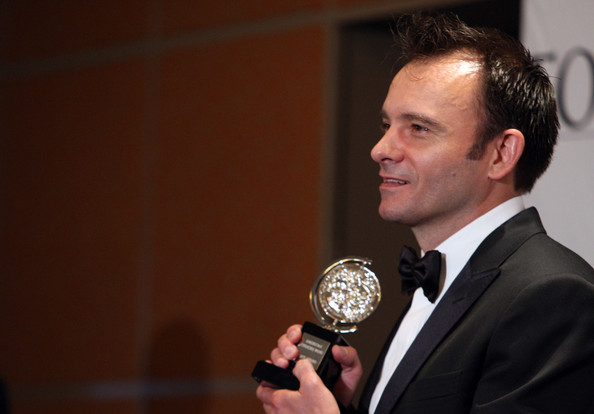 accepting his Tony for "God of Carnage"
accepting his Tony for "God of Carnage"
You were teenager when the events in the film happened, right?
I remember local picket lines during the strike. There was a big power station - they used to picket the gates to stop the coal deliveries. But at that age I don’t think I really understood. When I went to university I learned much more about the politics and the social upheaval. And then, you know, being interested in theater and music wasn’t common where I was growing up. There wasn’t a theater or drama group or anything nearby so that was considered as odd as dancing at a disco where only the women dance! [Laughs]
And working in theater for 25 years I obviously have learnt how to direct actors. I understand what actors need to do their best work; how little they need and how much they need in different circumstances. I understand how to really use rehearsals well to prepare yourself for spontaneity and also how to coordinate large groups of people in the musicals I’ve done. This particular movie is full of those kind of scenes where the ensemble acting can be at its best in a nuanced way. Those performances need to be coordinately carefully to try to let everybody have their moment, to get the story of the group.
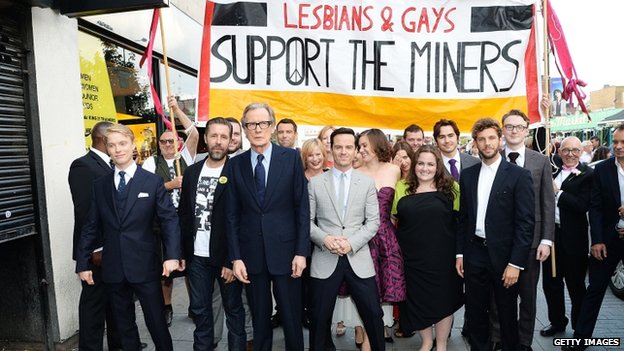 The cast at the film premiere in London
The cast at the film premiere in London
"The story of the group" - love that. Usually movies, even ensembles, are essentially one person's story. How hard was that community feeling to achieve?
To carefully convey that balance that was in the script took a lot of mathematics actually. I had a notebook writing down who should have the shot and who shouldn’t in different scenes ‘Don’t leave that scene without giving that persona at least a single but no need to worry about those two!'. I suppose some of the skills in theater helped [with Pride] but definitely the personal connection. Understanding the humanity of it - the injustice and bullying. These are things you see in Mathilda the Musical as well. The underdog standing up for what’s right. At some point in my childhood that got laid down pretty deep in me.
It’s funny that you mentioned the musical. I could not shake the feeling after my screening that someone is going to try to make Pride into a stage musical in ten years!
Well, the first time I read the script I called the producers to respond and I said “I loved it. It made me laugh. It made me cry. I think it’s important and the writing is fresh. I’d like to do it. However, the condition is can I put in my contract to share in the rights for the stage adaptation? I saw what you’re saying!
That someone could be you. Great news.
Having done that -- the film has a big heart and a golden uplifting quality despite its sadness and suffering in places. It's full of music and dances as well. But it's more to do with that uplifting quality that makes people think of musicals. However there is a balancing act in the movie between the golden side of things and the toughness and plainness of the difficult events that are being recounted.
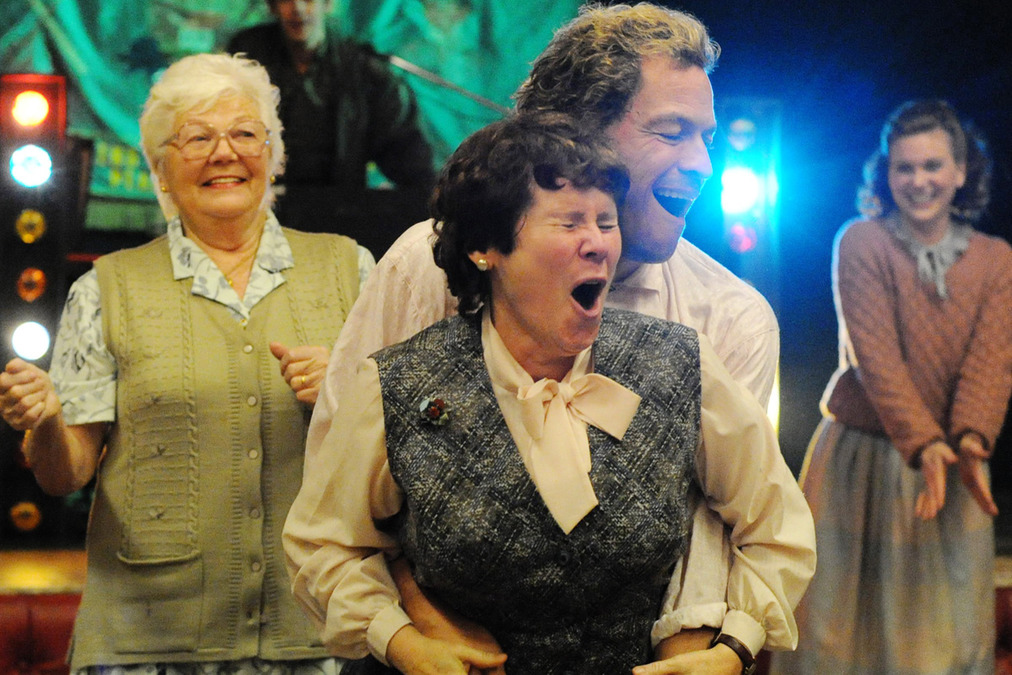
Musicals — you run the risk of increasing the sentiment. What I would want to be very sure of in developing a possible stage musical of it is that it still retains that balance, the toughness and authenticity and doesn’t become a sparkly over sentimental fairy tale. I am in a good position to police that because I know the anatomy of it inside out.
I love the screenplay by Steven Beresford. How complete was it?
It was really good. Stephen and I worked together for six months after that, modifying it a small amount, ten/fifteen percent. We slightly developed Mark’s story a little bit, added two or three scenes, cut four or five scenes, and tightened up the middle... things like that. Very happy collaborative stuff but if we hadn’t done anything the essential successes of the script would still have been there.
People don’t really realize — they’re probably not interested to be honest — that there’s a tangible difference between a script that’s been written by one person and a script that’s been over-noted and kind of written by committee. In a screenplay written by one person you get quirks and things that you’re not supposed to do. I love all that. I love that the script doesn’t behave in a totally conventional way all the time and that he just launched into the story without an individual hero. There was a lot of pressure for us to change the script and make it more about a single person or two people. But that was one change we definitely didn’t make.
Right call! Or you wouldn’t have that lovely sense of community. And I have to tell you it was a nice riposte to the fact that Margaret Thatcher was just being celebrated at the cinema a couple of years ago.
I completely agree. There’s something so lovely about seeing Bill Nighy say “Margaret Fucking Thatcher”. That’s not why we did it but it was a neat bonus that we were balancing that hagiography.
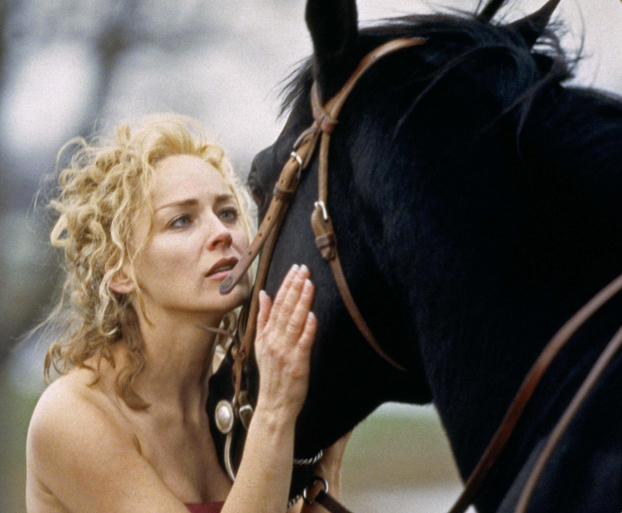 Sharon Stone starred in Simpatico (1999), Warchus' feature debutYou made one movie before Pride, Simpatico with Sharon Stone and Jeff Bridges back in 1999. Why so long to return to film?
Sharon Stone starred in Simpatico (1999), Warchus' feature debutYou made one movie before Pride, Simpatico with Sharon Stone and Jeff Bridges back in 1999. Why so long to return to film?
I enjoyed making that film. It didn’t do very well so it didn’t immediately lead to lots of exciting opportunities in film. I did have other opportunities but the exciting ones were in theater and that meant I was usually unavailable for the interesting things that did come up on film. And the time just ran away with itself. 5 years turned into 10. 10 to 15. Not quite sure how that happened.
You directed on Matilda: The Musical on stage and you’ll be doing the movie, too! How far along is that forthcoming film version?
The early days. I’m starting to work with Dennis, the writer of the musical, on the screenplay. We can’t start filming for two more years because there’s a contractual hold back for the stage production to play longer before a movie comes out.
Are you excited about it? The last stage production I saw of yours was God of Carnage which was brilliant. But then Roman Polanski did the film version. Had you felt possessive about that one?
 Gandolfini, Davis, Harden, & Daniels in God of Carnage, directed by Matthew Warchus. Reilly, Foster, Winslet & Waltz in film version by Roman Polanski
Gandolfini, Davis, Harden, & Daniels in God of Carnage, directed by Matthew Warchus. Reilly, Foster, Winslet & Waltz in film version by Roman Polanski
No. I was so happy with the stage version and I was skeptical about the idea of doing that on film. I don’t feel that way about Matilda. I’m really excited to tell that story. Whenever I was working on Matilda my head was full of ways that it could be translated to a really wonderful film. One of the things about directing Pride is that I immediately understood that my job as a director would be to be invisible. The most important thing would be to give the story a kind of documentary simplicity and put the characters front and center. So you don’t want big cinematic gestures. You don’t really want to feel that it’s been altered. Matilda is a different kind of film. It’s large scale thing with theatrical bravura. It’s nice as a director to move between contrasting things.
About that scale. Musicals are often so big but the character of Matilda is small. Wouldn't the movie need to be more intimiate than a regular musical?
The idea of having a little tiny person carrying a show in a 1000 seat theater and doing more on stage than any other child role like Oliver! or Annie — it was an experiment. But we found that the more you pile on, the more results you get. She’s got huge speeches and songs. She does a lot. It was a question of design really, that the lighting and music would create focus for those moments when we needed very little to be happening and just one small person to be holding the theater. It was exciting to try to give this tiny urchin status and authority in a large context. Of course on film being able to use closeups will be helpful. It will be a different job on film of how to get the sense that she’s tiny.
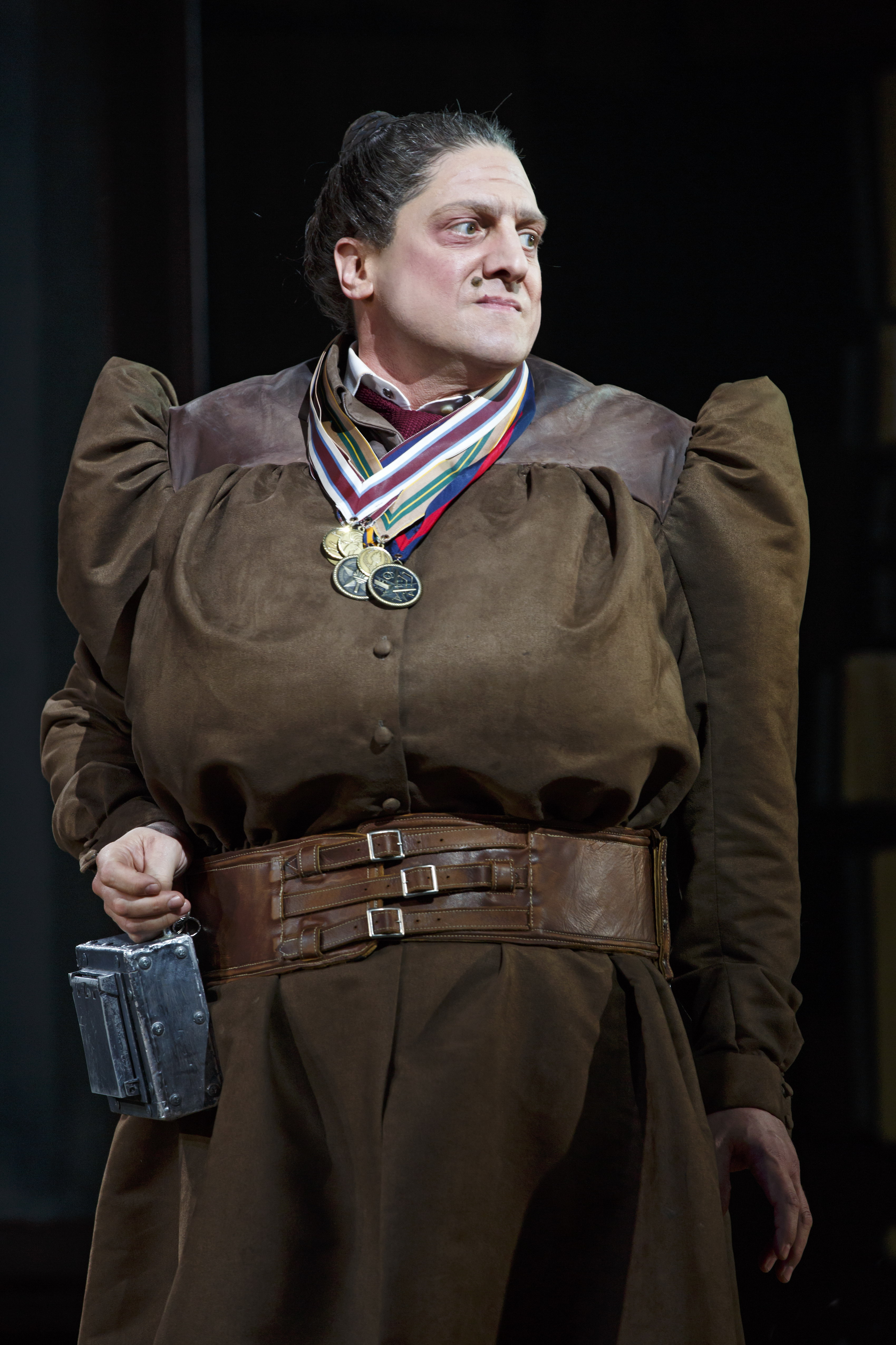 Christopher Seiber as Miss Trunchbull on BroadwaySince you’re two years away you don’t have to worry about casting quite yet but all your stage Matildas will be too old!
Christopher Seiber as Miss Trunchbull on BroadwaySince you’re two years away you don’t have to worry about casting quite yet but all your stage Matildas will be too old!
That’s right. They pass through that role quite quickly. A year and that’s it.
Do you think you’d stick with "Ms. Trunchbull" being played by a man in the film version?
Good question. I hadn’t really thought about it. I imagine we would but when I first cast that role on stage I didn’t exclusively audition men. I was looking at men and women. Because she’s kind of neither, really, she’s just monster without gender. In the end I thought it was a smaller step for a big beefy man to arrive at a hammer throwing headmistress monster than it would be for a woman.
You’ve been promoting Pride since the summer. What has been your favorite reaction?
The very first reaction came just two days after i finished editing at the Cannes film festival. That was about 900 people from across Europe, standing and cheering. That was the first glimpse that we had of how this might affect people who had no obvious immediate connection with the world of the story. Our screenings are getting further and further away from that tiny village in Wales. We had a screening in Los Angeles which is geographically the furthest away we’ve been so far. You think ‘Will the relevance dissipate the further away you get from the geographical heart of the story?’ But no! It got the same reaction, a tumultuous reaction, really. Same as it got when it screened in South Wales near the village and the same reaction when it was screened for the real LGSM members and their friends and family in SoHo.
To be honest with you there are some things that go beyond careerism. It was a privilege to direct this. We’re dwarfed by the real life events and how inspiring they are. I’m happy to be a part of anything which brings the story to a wider audience.”
